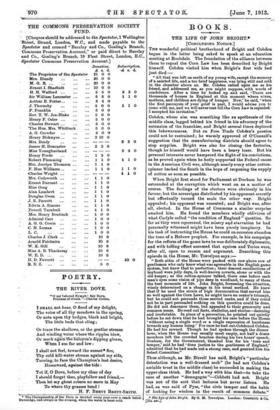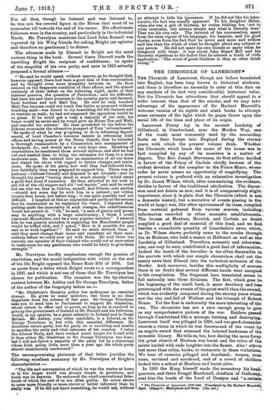BOOKS,
THE wonderful political brotherhood of Bright and Cobden began in the latter being asked to speak at an education meeting at Rochdale. The foundation of the alliance between them to repeal the Corn Law has been described by Bright himself. Cobden visited him when Bright's first wife had just died :— " All that was left on earth of my young wife, except the memory of a sainted life, and a too brief happiness, was lying still and cold in the chamber above us. Mr. Cobden called upon me as his friend, and addressed me, as you might suppose, with words of condolence. After a time he looked up- and said, 'There are thousands of houses in England at this moment where wives, mothers, and children are dying of hunger. Now,' he said, 'when the first paroxysm of your grief is past, I would advise you tc come with me, and we will never rest till the Corn Law is repealed.' I accepted his invitation."
Cobden, whose aim was something like an apotheosis of the middle class, lagged behind his friend in his advocacy of the extension of the franchise, and Bright several times deplored this lukewarmness. But on Free Trade Cobden's passion could not be restrained ; be warmly approved of O'Connell's suggestion that the manufacturing districts should agree to stop supplies. Bright was also for closing the factories, though he himself would have been a heavy loser. But his personal interests never hampered the flight of his convictions, as he proved again when he hotly supported the Federal cause in the American Civil war, although nearly every other cotton- spinner backed the South in the hope of reopening the supply of cotton as soon as possible.
When Bright first stood for Parliament at Durham he was astounded at the corruption which went on as a matter of course. The feelings of the electors were obviously in his favour, but the sovereigns distributed by his opponent secretly but effectually turned the scale the other way. Bright appealed ; his opponent was unseated; and Bright was, after all, elected. In the House of Commons a similar surprise awaited him. He found the members wholly oblivious of
what Carlyle called "the condition of England " question. Bo far as-they were concerned, the misery and starvation he had personally witnessed might have been purely imaginary. In
his task of instructing the House he could on occasion abandon the tone of a Hebrew prophet. For example, in his campaign for the reform of the game laws he was deliberately diplomatic, and with telling effect assumed that squires and Tories were, after all, open to reason and argument. Describing this episode in the House, Mr. Trevelyan says :- " Both sides of the House were packed with row above row of gentlemen who only knew what was agreeable in the English game system, but knew that to perfection ; their dearest recollections of boyhood were jolly days, in well-known coverts, alone or with the old keeper; as the cotton-spinner talked, there rose before each man's eyes some vision of joys deep in woodland, to many of them the best moments of life. John Bright, foreseeing the situation, wisely determined on a change in his usual method. He knew that if he used the strain of high denunciation that served him so well against the Corn Laws, he might have an orator's triumph, but he could not persuade those serried ranks, and if they could not be in part persuaded nothing on this question could be done.
He did not denounce them, but appealed to their generosity and common sense. He read out facts, statistics, and stories—damning
and irrefutable. In place of a peroration. he pointed out quietly before he sat down that he had brought his ease before the House 'without using a single word or a single expression of harshness towards any human being.' For once he had out-Cobdened Cobden. He had his reward. Though he bad spoken through the dinner hour, when the House was usually most empty, not half a dozer. members left the crowded benches during his two hours' speech. Graham, for the Government, thanked him for his 'tone and temper,' said he had 'done justice to the gentlemen of England,' admitted that he had made out a strong case, and granted him his Select Committee."
Thus although, as Mr. Birrell has said, Bright's "particular detestation was a well-dressed mob" (he had not Cobden's amiable trust in the middle class) he succeeded in making the upper class think. He had a way with him that—to take the case of another " demagogue "—Cobbett had not. Bright was not of the sort that lectures but never listens. He had, as was said of Pym, "the civic temper and the habit of looking for wisdom in the result of common debate."
0..%.7likestfe of John Bright. By G. M. Trevelyan. London: Constable Jc Co.
For all that, though he listened and was listened to, be was not the revered figure in the House that most of us remember till towards the end of his career. His affectionate followers were in the country, and particularly in the industrial North. Mr. Trevelyan mentions that Lord John Russell was reproved by his Whig friends for asking Bright (an agitator and therefore no gentleman !) to dinner.
The advances made by Disraeli to Bright are the most curious thing in the book. Several times Disraeli made the unwilling Bright the recipient of confidences ; he spoke of the stupidity of his own party, and once in 1852 actually proposed a formal alliance:—
" 'He said he would speak without reserve, as he thought that, hewever opposed, there had been a good deal of free conversation and he thought. even some sympathy between us. Ho then entered on the desperate condition of their affairs, and the almost certainty of their defeat on the following night, spoke of that infernal question, the question of Protection ; said his difficulty had been his and their promises to the country party and farmers, local burdens and now Malt Tax. He said he only touched Malt Tax because could not touch Tea duties as proposed without touching malt—was forced to try something for the farmers and to venture on malt; he had not supposed the opposition would be so great. If he could get a vote, a majority of one only, his honor would be saved and he would give up House Tax and Malt, and remodel his scheme.' He then proceeded to lay before the Liberal economist the attractive prospect of Tory retrenchment.' He spoke of what he was proposing, to do in reforming depart- ments, of Lord Chandas business talents in reforming Irish offices and saving money at the Horse Guards, that he intended a thorough examination by a Commission into management of dockyards, Sc., and would save a very large sum. Speaking of expenditure he mentioned those damned defences, and said he had cut and slashed them to bring the estimates for them to a more moderate sum. He entered into an examination of all our taxes and stated his views with regard to future changes and remis- sions. He spoke of his party, how well they had followed him, how faithfully they were prepared to support him. There was no jealousy—Cabinet friendly and disposed to act liberally—and he thought his party "having stood so much already" would stand a good deal more if necessary. He then adverted to his wish to get rid of the old stagers and old "red tapists" and said be could not see why we, that is, Cobden, myself, and Gibson—our section —should not some day bo with him in a cabinet ; not within twenty-four hours, but before long : it was quite possible and not difficult. I laughed at this as impossible and partly at the serious face he maintained as he explained his views. I objected that, putting aside the immorality of. such changes, the constituencies would not permit it. " Oh,' he said, "a man of genius and power may do anything with a large constituency ; I think I could represent Manchester, and be a very popular member." I assured him he was greatly mistaken in supposing the Manchester people would be trifled with, and I asked, " How is it possible for you and us to work together ? " He said we much mistook them. I said they must change their name and repudiate all their ante- cedents before we could ever act with them. He said there was scarcely one member of their Cabinet who would not at once retire to make room for any gentlemen who would be likely to give them strength.' " Mr. Trevelyan hardly emphasizes enough the passion of conviction, and the moral indignation with which at the end of his life Bright opposed the Home Rule Bill of 1886. Let us quote from a letter which Bright wrote to a correspondent in 1887, and which is not one of those that Mr. Trevelyan has chosen for publication. The occasion was the by-election contest between Mr. Ashley and Sir George Trevelyan, father of the author of the biography before us :— "Mr. Gladstone's disunion policy has undergone no essential change. He gives us many speeches ; but there is no clear departure from his scheme of last year. Sir George Trevelyan asks you to send him to Parliament to support Mr. Gladstone, whose return to office and to power, so long as he is resolved to give up the government of Ireland to Mr. Parnell and his followers, would, in my opinion, be a great calamity to Ireland and to Great Britain. Mr. Ashley, your other candidate, is a Liberal, as Sir George Trevelyan is, but with this essential difference. He doubtless values party, but for party he is unwilling and unable to sacrifice the unity and-vital-interests of his country. I value the Liberal Party, and have worked much longer fur it and with it than either Mr. Gladstone or Sir George Trevelyan has done ; but I will not follow a majority of the party led by a statesman whose Irish policy little more than a year ago the whole party almost unanimously condemned."
The uncompromising plainness of that letter justifies the following excellent summary by Mr. Trevelyan of Bright's characteristics :--
"The life and conversation of which he was the centre at home or in the larger world was always simple in greatness, and truth was its keynote. Re eschewed the small conventional false- hoods of which the rest of us are often guilty. He never strove to seem more friendly or more clever or better informed than he really was. If he did not know something, he would ask, without an attempt to hide his ignorance. If ha did not like his inter- locutor, the fact was usually apparent. To his daughter Helen, when she was a girl of thirteen, he writes bidding her 'not to write ironically, but always simply and what is literally true.' That was his own rule. The interest of his conversation, apart from the terse vigour of his language, his humour, and his good stories, arose from the fact that he never said more and seldom said less than the whole of what he thought about any subject or any person. He did not spare his own friends or party when he disagreed with them : it was about John Stuart Mill and his theoretic objections to the ballot that he uttered a truth of wide application: 'The worst of great thinkers is they so often think wrong.'"















































 Previous page
Previous page